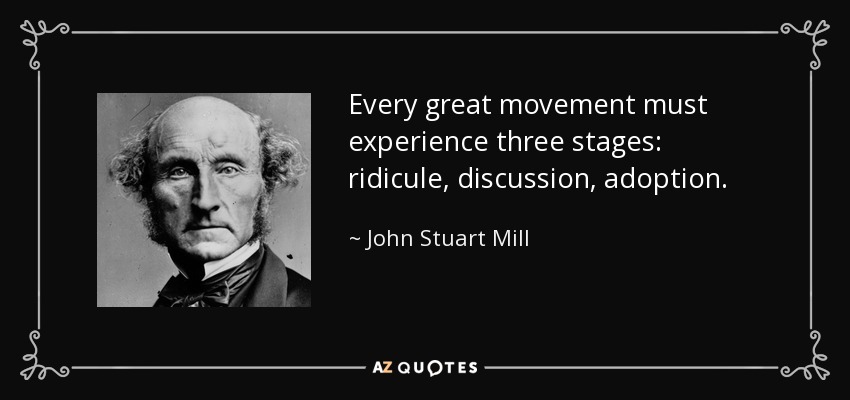Emily Blalock
4/25/16
Section 4
Philosophy
Dr. Oliver
John Stuart Mill: An
Early Feminist
John Stuart
Mill, the educational experiment of his father James Mill and the utilitarian
Jeremy Bentham, was one of the most influential philosophers of the nineteenth
century. He impressively began studying Ancient Greek at age three, Latin at
eight, and had an appreciation of a wide range of subjects including history,
economics, mathematics, and politics by the age of twelve. This education shaped his thinking and
influenced his philosophy. His essay, On
Liberty, continues to be read and discussed today, along with some of his
other writings.
Of his many contributions, one of
the most important may have been his radical campaign against injustice. He
stressed the importance of individuality, and was known as an early feminist. His
promotion of equality, which he argued for in The Subjection of Women, was extremely radical for his time. The
opening paragraph of the essay establishes his opinion:
‘The
object of this Essay is to explain as clearly as I am able grounds of an
opinion which I have held from the very earliest period when I had formed any
opinions at all on social political matters, and which, instead of being
weakened or modified, has been constantly growing stronger by the progress
reflection and the experience of life. That the principle which regulates the
existing social relations between the two sexes - the legal subordination of
one sex to the other - is wrong itself, and now one of the chief hindrances to
human improvement; and that it ought to be replaced by a principle of perfect
equality, admitting no power or privilege on the one side, nor disability on
the other.”
In other words, he establishes the fact that the
unequal status of the sexes, both socially and economically, hinders the
progress of society as well as the progress of humankind.
He argued women are excluded from
certain statuses in an effort by those in power asserting their will to remain
in power.
He fought for both social and legal
change for equality, and challenged the widely held belief of the time that
women were naturally inferior to men. During his time as a member of
Parliament, Mill petitioned for woman’s suffrage.
He argued
that the cult of domesticity, or the societal roles and expectations placed on
women, prevented women from reaching their full potential, and that they should
have access to more opportunities. This
expectation for women to solely rely on their husbands forced women into a
state similar to slavery, according to Mill.
The role of women in their marriage status is interconnected with their
role in the social world. He argued that equality would not only be good for
individuals, but for society as a whole.
Obviously,
Mill’s ideas about equality are still very relevant and important to us
today. He played a key role in
advocating women’s rights, and we have experienced many social changes since
his time. Some J.S. Mill quotes….
"I consider it presumption in anyone to pretend to decide what women are or are not, can or cannot be, by natural constitution. They have always hitherto been kept, as far as regards spontaneous development, in so unnatural a state, that their nature cannot but have been greatly distorted and disguised; and no one can safely pronounce that if women’s nature were left to choose its direction as freely as men’s, and if no artificial bent were attempted to be given to it except that required by the conditions of human society, and given to both sexes alike, there would be any material difference, or perhaps any difference at all, in the character and capacities which would unfold themselves.”
― John Stuart Mill, The Subjection of Women
― John Stuart Mill, The Subjection of Women
“After the primary necessities of food and raiment, freedom is the first and strongest want of human nature.”
― John Stuart Mill, The Subjection of Women
― John Stuart Mill, The Subjection of Women

Well done, Emily. Mill was perfectly consistent in applying his commitment to liberty indiscriminately, and I'll be he'd be applauding the decision to put Harriet Tubman (he was a fan of Harriets in general!) on the $20.
ReplyDelete